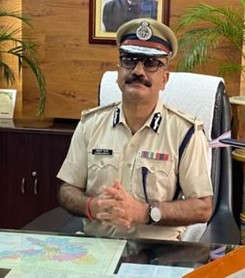'Can't be used to settle political scores': SC rejects contempt plea on Jharkhand DGP appointment
By IANS | Updated: August 18, 2025 18:35 IST2025-08-18T18:29:00+5:302025-08-18T18:35:11+5:30
New Delhi, Aug 18 The Supreme Court on Monday dismissed contempt petitions, filed by Jharkhand's Leader of Opposition ...

'Can't be used to settle political scores': SC rejects contempt plea on Jharkhand DGP appointment
New Delhi, Aug 18 The Supreme Court on Monday dismissed contempt petitions, filed by Jharkhand's Leader of Opposition Babulal Marandi and others, challenging the appointment of Anurag Gupta as the state's Director General of Police (DGP).
A bench, headed by Chief Justice of India (CJI) B.R. Gavai, observed that contempt proceedings cannot be used as a tool to settle political scores.
"Contempt proceedings cannot be used to settle political scores. Settle political scores among the public," the CJI remarked during the hearing.
The bench noted that the dispute essentially concerned two officers and was being projected as contempt.
It further said that the state government’s rules supported the appointment of the current DGP.
"If an officer is dissatisfied with the loss of his post or service benefits, he has legal remedies. Public interest litigations are meant for the deprived and helpless sections of society, not for settling personal disputes between two competing officers," the bench observed.
Senior advocate Anjana Prakash, appearing for the petitioners, argued that Jharkhand had appointed an ‘acting DGP’ in a manner similar to Uttar Pradesh, thereby bypassing the mandated process.
Responding to this, the CJI said: "Our extraordinary powers last until a law is made. Once the legislature frames a law, that law will apply instead of the court’s earlier directions."
The Jharkhand government was represented by senior advocate Kapil Sibal, who defended Gupta’s appointment.
Marandi and others had contended that the move violated the Supreme Court’s landmark 2006 judgment in Prakash Singh vs Union of India, which laid down guidelines for the appointment and tenure of DGPs.
The petition alleged that former DGP Ajay Kumar Singh was removed before completing his mandatory two-year tenure and that Anurag Gupta was illegally appointed as ‘acting DGP’.
With the dismissal of the petitions, the court made it clear that the matter was not one of contempt but of service-related grievances, which must be pursued through proper legal channels rather than political or public interest litigation.
Disclaimer: This post has been auto-published from an agency feed without any modifications to the text and has not been reviewed by an editor
Open in app